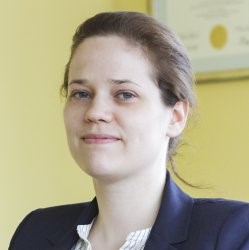Dr. Leslie’s academic training begin in 1998 as an undergraduate at UBC, where she immersed herself in the Combined Honours Physics and Mathematics Program, graduating as a Canada Scholar and recipient of the CK Choi Presidential Award. In 2002, she moved to UC Berkeley as an NSERC Fellow to pursue doctoral studies in optical and atomic physics. Under the guidance of Dr. Dan Stamper-Kurn, she pioneered imaging experiments of disorder-to-order transitions of atomic vapours held in optical traps. Her PhD work was published in top journals and provided her with extensive training in instrumentation, imaging, data analysis, and team-based science.
In 2009, she made a significant transition, from visualizing atoms in vacuum chambers, to visualizing biomolecules in liquids; a transition by a desire to get a little closer to life in her research. This transition to the Department of Chemistry and Chemical Biology at Harvard University was made possible with a Mary Fieser postdoctoral fellowship, with the mandate to explore this inspiration. At Harvard, Dr. Leslie invented a single-molecule imaging technology called Convex Lens-induced Confinement (CLiC), which established her as a pioneer in single-molecule investigations with a range of applications.
In 2012, Dr. Leslie became an Assistant Professor at McGill University and founded her research group. She has developed CLiC into a platform technology and used it for new studies of nucleic acids, proteins, polymers, nanomaterials, biologics, cells, etc. Her time at McGill has been productive and she was promoted to Associate Professor with tenure in 2017. To expand, commercialize, and protect her technology and key applications, she co-founded a start-up company called ScopeSys, with a technical and business team based in Canada.
Dr. Leslie’s elegant and revolutionary platform has allowed investigations into the kinetics, dynamics and interactions of biomolecules that were not previously possible. Her work astonishes by its breadth and depth. It is rooted in fundamental studies, for example of the untangling of structural transitions in nucleic acids, or of the phase condensation which occurs in cell nuclei at high molecular concentrations, which influence crucial biological function. It also has important applications, for example quantitative studies of the therapeutic perturbation of protein and nucleic acid complexes which help bring into focus how drugs work. Her scientific excellence, entrepreneurship and dedication both as a collaborator and mentor are a great benefit to the Canadian biophysics community. Sabrina is currently an Associate Professor of Physics and Quantitative Life Sciences at McGill University, as well as co-founder of ScopeSys, a Canadian startup company whose mandate is to bring single-molecule precision and control to real-world applications.


